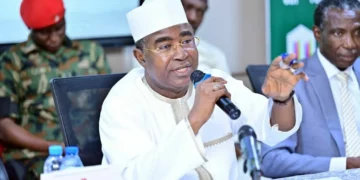Schneider Electric has announced that it has electrified, automated, and digitised 95 per cent of its operations in Nigeria’s energy sector, powering critical infrastructure and advancing industrial automation across the country.
The country president of Schneider Electric for English-speaking Africa, Ajibola Akindele, disclosed this during the company’s Innovation Day Nigeria 2025, held in Lagos to mark its 25th anniversary of operation in the country.
With the theme “Competitive Advantage Through Automation and Sustainability,” the event brought together over 400 customers, 70 C-level executives, senior government officials, and business leaders to explore how digital innovation can accelerate Nigeria’s energy transition and industrial growth.
Akindele stated that the company has experienced significant growth since its inception. “In the year 2000, we began with just one employee.
Twenty-five years later, we have grown to over 200 employees supporting critical infrastructure across energy, power and grid, data centres, buildings, telecommunications, and manufacturing,” he said.
He further revealed that Schneider Electric currently electrifies, automates, and digitises 100 per cent of the energy produced in Nigeria, 95 per cent of the country’s refining operations, and 55 per cent of its food production.
“Within the Lagos metropolis, there’s a 65 per cent chance that the electrons powering your home or office flow through Schneider Electric equipment,” he added.
Akindele also noted that the company partners with more than 400 organisations nationwide, creating over 3,000 jobs and contributing to sustainable development.
Dignitaries at the event included the Minister of Power, Chief Adebayo Adelabu (represented by Adedayo Olowoniyi); CEO of Ikeja Electric, Folake Soetan; director General of the Energy Commission of Nigeria, Dr Mustapha Abdullahi; Consul General of France in Nigeria, Laurent Favier; and senior director, SEforAll Universal Energy Facility, Anita Otubu. Others included top Schneider Electric executives, such as Walid Sheta, Zone President for the Middle East and Africa.
Representing the Minister of Power, Olowoniyi reaffirmed the government’s commitment to supporting innovation and partnerships aimed at driving efficiency, sustainability, and inclusive growth. “Repositioning the Nigerian power sector for sustainability, efficiency, and growth requires legislation, policy reforms, infrastructure development, energy transition, expanded access, local content development, and capacity enhancement,” he said.
In his keynote address, Walid Sheta highlighted the four megatrends reshaping global energy: energy transition, digitisation and AI, infrastructure development, and global rebalancing. “Electrification is key in the world of tomorrow to achieve greater efficiency,” he stated.





